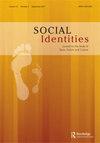We have to talk about whiteness: widening the decolonial gates*
IF 0.7
Q3 ETHNIC STUDIES
引用次数: 0
Abstract
ABSTRACT Recently, the Latin American decolonial perspective has been receiving growing attention, not only in academia, but also in other social, political, and cultural spaces, including in Brazil. Among other debates, decolonial thinkers have brought to light the continuity of coloniality in different dimensions (particularly, even if not only) of Latin American realities, long after the territorial colonization was over. Therefore, by highlighting, debating, and theorizing on the colonialities of power, knowledge and being from a decolonial perspective, scholars have been unmasking the vast, violent, and oppressive consequences of Western, Eurocentric, modern, colonial, capitalist, racist and patriarchal paradigms, which still (even if with adaptations) dominate our multiple realities. Race is at the center of the continuity of coloniality and colonial heritage, imposing ontological and epistemological hierarchies that have caused the never-ending racialization, marginalization and suffering of most Latin Americans for centuries. Still, some debates and dimensions related to race could (and, as I will argue, should) be further explored within the decolonial perspective. In this paper, I would like to present whiteness studies and scholars as potential contributors to these debates in Latin America, further widening the decolonial gates, allowing us to better comprehend and critically analyze the many forms of continued coloniality and their violent, oppressive, and terrible consequences.我们必须谈论白人:扩大非殖民化的大门
最近,拉丁美洲的非殖民化观点受到越来越多的关注,不仅在学术界,而且在其他社会、政治和文化空间,包括在巴西。在其他辩论中,非殖民化思想家揭示了在领土殖民化结束很久之后,殖民主义在拉丁美洲现实的不同方面(特别是,即使不是唯一)的连续性。因此,从非殖民化的角度出发,通过强调、辩论和理论化权力、知识和存在的殖民性,学者们一直在揭露西方、欧洲中心、现代、殖民、资本主义、种族主义和父权范式的巨大、暴力和压迫后果,这些范式仍然(即使经过调整)主导着我们的多重现实。种族是殖民和殖民遗产连续性的核心,强加于人的本体论和认识论等级制度导致了几个世纪以来大多数拉丁美洲人无休止的种族化、边缘化和痛苦。尽管如此,与种族有关的一些辩论和方面可以(并且,正如我将论证的那样,应该)在非殖民化的角度内进一步探讨。在本文中,我想介绍白人研究和学者作为拉丁美洲这些辩论的潜在贡献者,进一步扩大非殖民化的大门,使我们能够更好地理解和批判性地分析多种形式的持续殖民及其暴力,压迫和可怕的后果。
本文章由计算机程序翻译,如有差异,请以英文原文为准。
求助全文
约1分钟内获得全文
求助全文
来源期刊

Social Identities
ETHNIC STUDIES-
CiteScore
2.00
自引率
0.00%
发文量
22
期刊介绍:
Recent years have witnessed considerable worldwide changes concerning social identities such as race, nation and ethnicity, as well as the emergence of new forms of racism and nationalism as discriminatory exclusions. Social Identities aims to furnish an interdisciplinary and international focal point for theorizing issues at the interface of social identities. The journal is especially concerned to address these issues in the context of the transforming political economies and cultures of postmodern and postcolonial conditions. Social Identities is intended as a forum for contesting ideas and debates concerning the formations of, and transformations in, socially significant identities, their attendant forms of material exclusion and power.
 求助内容:
求助内容: 应助结果提醒方式:
应助结果提醒方式:


